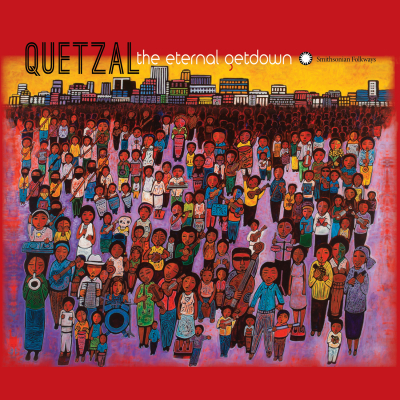Smithsonian Folkways RecordingsClient Information
18 January, 2017Print

A Transcendental Journey to Getdown: GRAMMY Award-Winning Quetzal to Release 'The Eternal Getdown' on March 10th, 2017
For more than 20 years, Grammy Award winners Quetzal, the East L.A. Chicano rock group, has been fighting oppression with their unique, culturally diverse soundscapes. With 'The Eternal Getdown,' Quetzal's second release in Smithsonian Folkways Recordings' Tradiciones/Traditions series, the band has created a radical sound project. Based in artivism (art + activism), feminist ideals, and the belief that making music together has the profound potential for change, 'The Eternal Getdown' seeks to cultivate joy in a world determined to break wills and keep disenfranchised people down.
'The Eternal Getdown,' to be released on March 10th, 2017, features 18 original compositions performed by a total of 22 musicians, including guests such as Aloe Blacc, Ramón Gutiérrez, Rocío Marrón, César Castro, and Joey De Léon, to name a few. 'The Eternal Getdown' follows Imaginaries, Quetzal's 5th album release and first for Smithsonian Folkways Recordings, which was recognized by the Recording Academy with a Grammy Award for "Best Latin Rock, or Urban, or Alternative Album" in 2013.
Since 1993, founding band member Quetzal Flores, along with his partner Martha González, has been creating music that speaks to the responsibility of bearing witness to one's community and acting as agents of transformation. Having grown up in East L.A., they internalized the unique overlap of diverse cultures, sounds, and struggles, and 'The Eternal Getdown' is a continuation of their artivist efforts. Quetzal's music incorporates traditional son jarocho, Cuban batá, funk, Chicano rock, soul, and rhythm and blues which encourages us to recognize the fluidity of the varying sounds, and the historical and ancestral relationship between them.
"Songwriting is storytelling," says González. "A song as a sonic and literary manifestation is life's soundscape, a unique cathartic memento, as well as a powerful political tool. Without question music is an important historical text. A person's life-views, triumphs, and struggles can be poured into song." In this way, each track on 'The Eternal Getdown' serves a purpose in highlighting three key themes: resilience, feminist knowledge, and transcendence.
On "Pillow People," listeners hear about the migrant trails and the dangerous journey the "pillow people" embark as the "need built by greed" forces them to flee their ancestral homes. Another notable track is "La Bamba," the uplifting arrangement of the iconic Mexican son jarocho which conjures up Ritchie Valens to Los Lobos yet is uniquely a Quetzal sound. "La Bamba" features the tarima--a dance platform that doubles here as a percussion instrument--the requinto melody guitar, electric guitar, and the jarana, a strummed 8-string instrument.
Throughout, 'The Eternal Getdown' beckons listeners to speak up and work for change in these critical times. It is a cry to push back on injustice and oppression, and to "accept the invitation to commit to the lifelong struggle for social justice."
'The Eternal Getdown' Tracklisting:
1. Espejos vs. The Gaze (Espejos vs. La Mirada)
2. Pillow People (Gente de Almohada)
3. Critical Time (Tiempo Crítico)
4. Barrio Healer (La Curandera del Barrio)
5. Olokun y Yemayá
6. La danza de Coyolxauhqui (The Dance of Coyolxauhqui)
7. La bamba
8. Get to Knowing (Conociendo)
9. ¡Mira! (Look!)
10. Mamá Nahual
11. La Lloroncita
12. Ay que no que no
13. Unbound (Sueltos)
14. Pajaritos
15. Cellular Memory (Memoria Celular)
16. Godo Alfredo
17. Toro Ayotzinapa
18. La indita
About Smithsonian Folkways:
Smithsonian Folkways Recordings is dedicated to supporting cultural diversity and increased understanding among people through the documentation, preservation, production, and dissemination of sound. Part of the Smithsonian Center for Folklife and Cultural Heritage, it is the nonprofit record label of the Smithsonian Institution, the national museum of the United States. NOTE: Smithsonian Folkways Recordings retail distribution in the US is through ADA (Alternative Distribution Alliance) at 800.239.3232. Smithsonian Folkways Recordings releases are available through record and book outlets. Smithsonian Folkways Recordings, as well as Folkways Records, A.R.C.E., Arhoolie, Banjo Builders, Blue Ridge Institute, Cook, Collector, Dyer-Bennet, Fast Folk, I.L.A.M., The Mickey Hart Collection, Monitor, M.O.R.E., Paredon, and UNESCO, are available via mail order at 888.FOLKWAYS or 800.410.9815. Visit the Smithsonian Folkways Recordings website at folkways.si.edu or write to 600 Maryland Ave. SW, Suite 2001, Washington, DC, 20024.
More Info on Smithsonian Folkways:
Official Website: folkways.si.edu
Facebook: facebook.com/smithsonianfolkwaysrecordings
Twitter: twitter.com/folkways
Instagram: instagram.com/smithsonianfolkway
YouTube: youtube.com/user/smithsonianfolkways
For more information on Smithsonian Folkways, contact Andrea Evenson (aevenson@shorefire.com) or Mark Satlof (msatlof@shorefire.com) at Shore Fire Media, 718 522-7171
